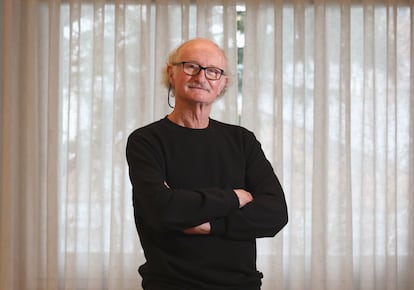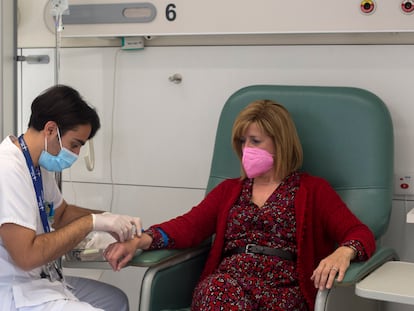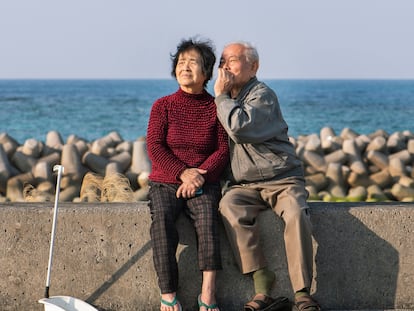‘We may reach a stage where we can make most cancer patients live a normal life’
Moshe Oren, a researcher at the Weizmann Institute of Science in Israel, is a pioneer in the study of the p53 gene, which plays a leading role in tumor development

Moshe Oren, 73, is a Polish-born researcher who helped isolate the p53 tumor suppressor gene in the early 1980s. This gene plays an important role in the development of numerous tumors, and after many years of research, p53 was identified as “the guardian of the genome” because its work helps the body eliminate cancerous cells.
Oren, who emigrated to Israel as a child in the 1950s, has done research that helped shed light on the role of p53 in maintaining normal cell development. Tumors grow when some cells do not respond to their programmed obsolescence: instead of dying when the time comes, they keep reproducing uncontrollably. In many cases, this is because p53 has mutated and is not doing its job of ordering the cells to die in a process known as apoptosis.
The description of cancer as a genetic disease, and of the molecular processes that cause it, have allowed researchers to develop new forms of treatment. The world’s leading cancer research centers are now combining this investigation into fundamental biology with the search for solutions.
Oren currently heads the Moross Integrated Cancer Center at the Weizmann Institute of Science in Israel. Last week, researchers from this institution and from Spain’s National Center for Cancer Research (CNIO) met at the Ramón Areces Foundation in Madrid to share their most recent findings on the understanding of the mechanisms underlying cancer.
Question. For many years now we have known that cancer is not one disease but many diseases, and that even within the same patient the characteristics of tumors may vary. Does this mean we should assume we are dealing with a great many diseases that need to be tackled separately, or is there hope for some kind of unified theory to find common aspects that could simplify cancer treatments?
Answer. This is where the field is going. On the one hand, we now have the tools to see complexity. And the more we use the tools, we see more levels of complexity. We see a lot of differences between each individual cancer patient, and even differences between cells within an individual tumor. But now the challenge is to take all this data and look for common denominators.
There’s no way there’s going to be one cure for cancer. But on the other hand, we don’t want to be in a situation where we will need a million cures for cancer. We cannot define the common denominators without understanding all the complexity and putting it together and then looking at a particular set of alterations in cancer, what they have in common. There is not going to be one therapy that treats all cancer patients. But defining the right combination of treatments that takes into account the diversity of patients is going to work. So I believe that in the end, we will be able to use a limited number of treatments, but intelligently combining them together.
Q. What are the obstacles in the way of these goals?
A. The main challenge that we have now in connecting what we learn to what we can do is that for many of the alterations that occur in cancer, we still don’t have good treatments. Every cancer patient now can have the tumor sent for what we call a gene panel. And there are companies and big medical centers that do it. They look at sometimes 100, 200, 300 genes and they can identify mutations in the tumor that are known to be important for the development of cancer. But for most of those, we still don’t have a treatment. So on the one hand, we want to fill the missing gaps so that we have; if we have a particular type of mutation, we can have a treatment that is preferential for this mutation. But on the other hand, we don’t want to be in a situation that for each mutation, we will need the treatment. So we want to find what is common between the biological implications of a particular set of mutations.
Our body and evolution didn’t prepare us to live 80 to 90 years, it prepared us to live 30 to 40 years, make the next generation and go away
I think the effort would be on the one hand to develop new drugs because we definitely don’t have enough new targeted therapies. The challenge would be to take all the huge amount of data that we can generate, which tells us that cancer is even more complex than we thought. It’s not one disease, not even 300 diseases, but in fact, it’s in a spectrum from a continuum of diseases, and we want to be able to take this complexity and, using artificial intelligence methods, to bring it down to something which is simpler and can be given to the clinician for treatment. I think that is going to be the game: to identify, understand complexity at the highest level, and then try to reduce it to practical treatments that will not be endless a number.
Q. Is artificial intelligence being used for this?
A. People are already using artificial intelligence to deconvolute medical data, and not only in cancer research, but it’s still in the early stages. In the last 10 years, there’s been extensive collaboration between computer scientists, data scientists and cancer researchers who generate the data. And it’s going to be a main theme in the effort to overcome cancer. It’s a slow process that is still growing, and most of it will happen in the future.
Q. Is it necessary to understand all the basic mechanisms of cancer in order to fight it, or is it possible to keep looking for solutions by trial and error?
A. Maybe we don’t have to understand everything, I don’t even know what it means to understand everything. It’s like understanding the universe is the limit of everything. But the more we understand, the better is the chance that we will not make mistakes in reaching a decision. In the laboratory we take 20 mice, we give one mouse this treatment, one mouse that treatment, then we compare and see what works best. With humans, we cannot do that.
We cannot take the person and try different things, although now unfortunately it happens very often because somebody does not respond [to the first course of treatment]. But that’s not the right way. What we want is to increase the likelihood that the first treatment that the patient gets will be the best treatment that is available for that patient. And that’s one of the major problems with cancer therapy, it’s still very much trial and error, because it’s not only that we don’t understand enough, we also don’t have enough biomarkers.
We want to have a set of biomarkers that we can measure in the patient. And we’ll need to use machine learning for that. If we can establish clear correlations, even if we don’t understand everything, it’s already good enough, because we can then say ‘if a patient has this and this and this, he or she will respond better to a particular treatment.’
Q. Is there a risk that new cancer treatments will be very efficient but fail to reach everyone because of their excessive cost?
A. That is a very delicate issue. Some treatments are expensive to develop and others, like CAR-T, are also expensive to produce. Some of the anti-cancer targeted therapy drugs that are in the market now are not costly to produce, but the research that went into it is very expensive. And the companies want to get back the investment by charging high amounts for the drug. So it becomes not only an ethical issue, but also a legislative issue. It’s global health policy, the question of whether governments could come up with a policy that can guarantee the company’s research on condition that if that is successful, the companies will charge something more realistic. It’s a major concern.
Q. Research on aging has taken off in recent times as a way to investigate many diseases with a global approach. Do you think this kind of work could be useful in the fight against cancer?
A. Simply put, the biggest risk factor for cancer is aging. Aging is definitely a gate opening for cancer, because the general thinking is that our body and evolution didn’t prepare us to live 80 to 90 years, it prepared us to live 30 to 40 years, make the next generation and go away. And cancer is an accident of this extended lifespan. So understanding aging better is going to be very valuable also for reducing the incidence of cancer. There’s no doubt that aging research is important on its own, because in addition to cancer aging has many additional effects. If you can make aging less symptomatic, that would be almost a dream fulfilled.
Q. Do you believe that one day we will be able to completely eradicate cancer?
A. I don’t think we will be able to get into a stage in which cancer does not exist. It’s not like something viral, the Black Plague or things like that, where you immunize and vaccinate and you get rid of it. Cancer is not cancer, it’s many cancers. But we may reach a stage where we can make most cancer patients live a normal life, as when you have a chronic disease like high blood pressure where you take something to lower it. I think controlling cancer is more realistic than eliminating cancer completely. I wish, but I don’t think it’s realistic.









































